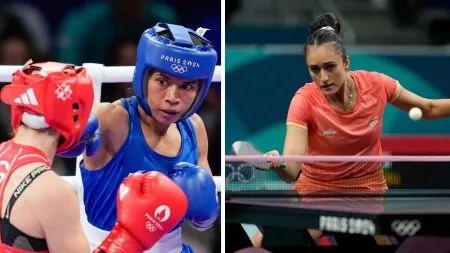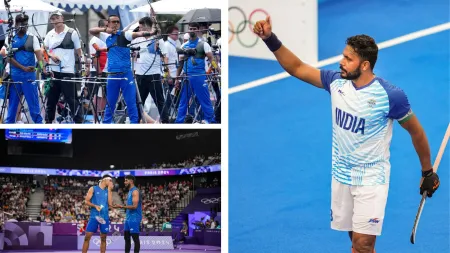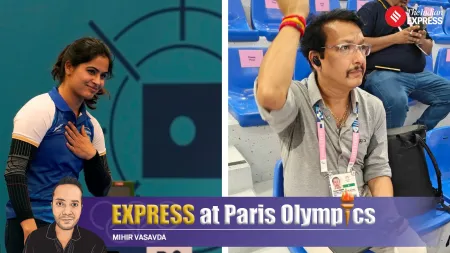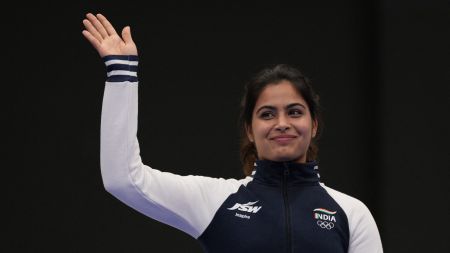Two books hit the stands across Paris in the months leading up to the Olympics. One was written and published by the family of Pierre de Coubertin, replete with nuggets from his personal life and the stories behind the revival of the Olympics.
“We saw it as an incredible opportunity… he is a figure that can kind of come back from the dead and be put on the spotlight in France,” Alexandra de Navacelle de Coubertin, a fourth-generation descendant of the ‘founder’ of the modern Olympics, tells The Indian Express.

The second, released in May, was more of a biographical essay in French. Its title, translated literally, gives away its contents: “Pierre de Coubertin: the man who did not invent the Olympic Games.”
In the backdrop of the Paris Olympics, another tussle is being played out: to define the legacy of Pierre de Coubertin.
Across the world, de Coubertin is celebrated as a visionary who revived the Olympics. At his home, the Paris-born aristocrat is at the heart of the debate over ‘cancel culture’.
His admirers hail him for ‘introducing sport at schools’, ‘opening the doors of stadiums to women two decades before they were allowed to vote’ and envisioning ‘peace’ through the medium of the Olympics.
De Coubertin’s detractors, especially in France, have accused him of being a ‘misogynist’, called him a ‘fanatical colonist’ and even criticised him for a correspondence with Adolf Hitler after the 1936 Olympics.
His family has contested all these charges.
“I don’t want to simplify by saying cancel culture… but today, we have this generation that’s very, very proactive in trying to correct history. And I think that in doing so, they may be judging harshly on things that we can’t really understand fully because we’re not in the times,” Alexandra, de Coubertin’s great-granddaughter, says.
Throughout the build-up to the Paris Games, de Coubertin’s role in reviving the Olympics has been severely downplayed. He did not feature prominently in any official narrative, until the last few weeks when the International Olympic Committee and local organisers spoke about him more openly.
Political hot potato
But politically, de Coubertin’s legacy has also been the subject of a slugfest in France. In 2022, former Olympic champion Guy Drut and French academician Erik Orsenna wrote to the country’s President Emmanuel Macron to induct Coubertin into the Pantheon. The request, till today, has been ignored.
Last month, when a tribute concert was held at the Sorbonne University in central Paris, government officials, including Paris mayor Anne Hidalgo, stayed away.
It took an outsider, International Olympic Committee president Thomas Bach, to ‘remind’ the French of his legacy. “The Olympic Games and the sporting model he created have stood the test of time. That’s why France can be proud of Coubertin and his legacy,” he said during the function at the Sorbonne.
Alexandra doesn’t directly address the question of the government snub. “Politics is politics. I think they have a different agenda and I’m not here to judge,” she says. “I would say that the people who are really carrying the Olympic role and the responsibility of making the Games happen speak of Coubertin. That is IOC, Tony Estanguet (organising committee chief), David Lappartient, the president of the French NOC (National Olympic Committee).”
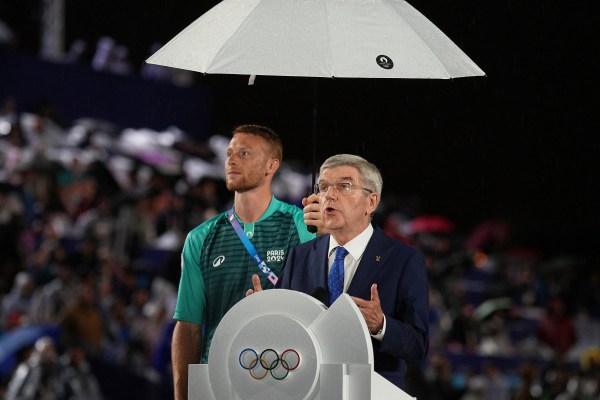 Last month, when a tribute concert was held at the Sorbonne University in central Paris, government officials, including Paris mayor Anne Hidalgo, stayed away. It took an outsider, International Olympic Committee president Thomas Bach, to ‘remind’ the French of Coubertin’s legacy. (Xu Chang/Pool via REUTERS)
Last month, when a tribute concert was held at the Sorbonne University in central Paris, government officials, including Paris mayor Anne Hidalgo, stayed away. It took an outsider, International Olympic Committee president Thomas Bach, to ‘remind’ the French of Coubertin’s legacy. (Xu Chang/Pool via REUTERS)
Alexandra is one of the faces representing the de Coubertin family in trying to bust the ‘myths’ surrounding their forefather — not to ‘glorify’ him, she adds, but to ‘understand’ his character. It’s been a battle, she adds, because of the ‘typical French’ trait to not eulogise people.
“I lived in the US for many years and the American spirit is to celebrate their heroes. They do it a bit too much in my personal opinion… (But) the other extreme is the French,” she says. “They are huge critics and they do it because they have this need to make sure that they are thinking thoroughly and deeply; not fooling themselves and that they are aspiring to speak the truth. But, in a way, that is creating constant doubt, the constant need to question everything. So it’s a country that does not celebrate itself.”
Critical eye
One of the biggest criticisms levelled at de Coubertin is that he did not advocate the participation of women athletes. According to France24, de Coubertin said during a radio interview in 1935 that the role of the women should be to ‘crown the winners’.
“The real Olympic hero is, in my eyes, the individual adult male,” he reportedly said. “I personally do not approve of women taking part in public competitions, which does not mean that they should refrain from practising a large number of sports, but without making a spectacle of themselves. At the Olympic Games, their role should be – above all, as at the old tournaments – to crown the winners.”
Alexandra says it is important to read these statements in the context of the time they were said.
“(Back then) women did not really have much of a place. They were hiding behind a man. They never showed their ankles. They had dresses that covered their necks. I mean, they were kind of seen as fragile…
“So the thinking at the time was not paired to see a woman showing her legs, running on the field, sweating. This was just shocking. And Pierre de Coubertin was concerned that men who went to see women were not looking at sports. They were looking at something not decent. So his idea was to protect women. In today’s context, it’s of course absurd.”
She also denies the allegations of racism and adds that the letter to Hitler — in which de Coubertin praised the 1936 Olympics — is taken out of context.
“There is a letter from Pierre de Coubertin saying ‘Great Games’. Does that mean he’s a Nazi? When you look at the times, this is 1936. The Olympics were not what they are today. No one was paying attention, money or investment. It was the first time that a country built a massive stadium and put in such energy… it was never done in the history of the Games. So in that aspect, (de Coubertin wrote) ‘Great Games’. Now, it was instrumentalized for terrible ideologies. That is awful. Was Pierre de Coubertin supporting that? No. Because when you read his speeches, he’s always saying ‘no nation, no race, no religion, no work should be excluded from the Olympics.’”
Olympics 2024- From the turmoil of Tokyo, Manu Bhaker extracts the poise for a Paris medal
- Manu’s motivations: From Usain Bolt’s autobiography to unique training methods
- Gita lessons help Manu Bhaker find redemption for Tokyo in Paris with a bronze
During the closing montages of Friday’s opening ceremony, which captured the Games’ journey over the last century, the man with thin, grey hair and a thick moustache made a blink-and-you-miss appearance.
That split-second moment answered at least one question that was the elephant in an Olympic-sized room: if — or how much — prominence would be given to that man during the Paris Games. But the dispute over his legacy continues.
Disclaimer: The copyright of this article belongs to the original author. Reposting this article is solely for the purpose of information dissemination and does not constitute any investment advice. If there is any infringement, please contact us immediately. We will make corrections or deletions as necessary. Thank you.
